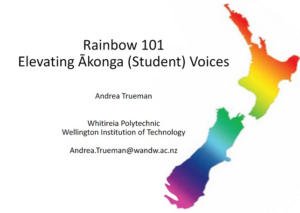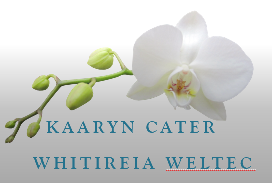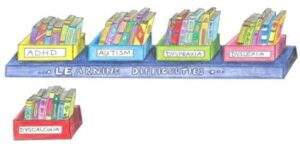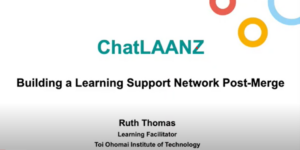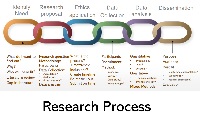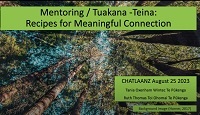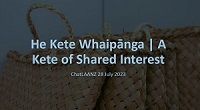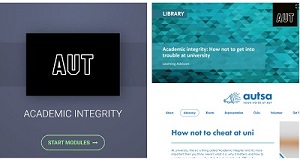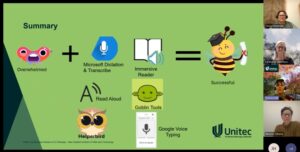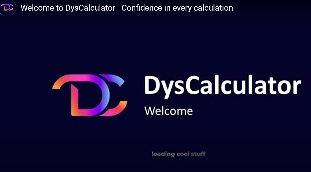ChatLAANZ
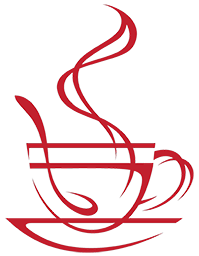
Welcome to ChatLAANZ
ChatLAANZ is a professional development and community building opportunity based on a model demonstrated by Australia and New Zealand Student Services Association Inc (ANZSSA). They are Zoom (or Teams) meetings of about 40-50 minutes each, scheduled at lunchtime. The sessions provide examples of what colleagues at various institutions are doing in certain areas of interest.
In 2025, we are holding lunchtime sessions from 12:10 – 1:00 pm on specified Thursdays each month between March and October.
11 April | 29 May | 12 June | 31 July | 28 August | 25 September | 30 October
A Zoom or Teams link will be emailed to you prior to the session. You can also access the link on the CHATLAANZ page (use the little form just below for this). When possible, we made the slides and recordings of the sessions available. Scroll to see the block called “Past ChatLAANZ sessions”.
2025 ChatLAANZ recordings
NB: From 2025 onwards we are linking to ChatLAANZ in Youtube. Click the links to view.
May 2025
Topic: The challenge of generating meaningful evidence of our impact
Facilitators: Rachael Harding and Mark Bassett
June 2025
Matariki– For you, for me, for everyone
Facilitator: Tania Oxenham (Wintec)
Topic: Uniquely ours, Matariki allows us to forge forward knowing that this is who we are. This presentation will give an overview of Matariki, how it can connect us through teaching and ways to enjoy it outside of the work domain. Useful resources will be provided to build our ways of making Matariki part of our tomorrow story.
Watch this session
May 2025
Topic: The challenge of generating meaningful evidence of our impact
Facilitators: Rachael Harding and Mark Bassett
Watch this session
April 2025
Topic: Professional Accreditation Award
Facilitator: Deborah Laurs
Watch this session
June 2025
Matariki– For you, for me, for everyone
Facilitator: Tania Oxenham (Wintec)
Topic: Uniquely ours, Matariki allows us to forge forward knowing that this is who we are. This presentation will give an overview of Matariki, how it can connect us through teaching and ways to enjoy it outside of the work domain. Useful resources will be provided to build our ways of making Matariki part of our tomorrow story.
Watch this session
May 2025
Topic: The challenge of generating meaningful evidence of our impact
Facilitators: Rachael Harding and Mark Bassett
Watch this session
April 2025
Topic: Professional Accreditation Award
Facilitator: Deborah Laurs
Watch this session
June 2025
Matariki– For you, for me, for everyone
Facilitator: Tania Oxenham (Wintec)
Topic: Uniquely ours, Matariki allows us to forge forward knowing that this is who we are. This presentation will give an overview of Matariki, how it can connect us through teaching and ways to enjoy it outside of the work domain. Useful resources will be provided to build our ways of making Matariki part of our tomorrow story.
Watch this session
May 2025
Topic: The challenge of generating meaningful evidence of our impact
Facilitators: Rachael Harding and Mark Bassett
Watch this session
April 2025
Topic: Professional Accreditation Award
Facilitator: Deborah Laurs
Watch this session
June 2025
Matariki– For you, for me, for everyone
Facilitator: Tania Oxenham (Wintec)
Topic: Uniquely ours, Matariki allows us to forge forward knowing that this is who we are. This presentation will give an overview of Matariki, how it can connect us through teaching and ways to enjoy it outside of the work domain. Useful resources will be provided to build our ways of making Matariki part of our tomorrow story.
Watch this session
May 2025
Topic: The challenge of generating meaningful evidence of our impact
Facilitators: Rachael Harding and Mark Bassett
Watch this session
April 2025
Topic: Professional Accreditation Award
Facilitator: Deborah Laurs
Watch this session
June 2025
Matariki– For you, for me, for everyone
Facilitator: Tania Oxenham (Wintec)
Topic: Uniquely ours, Matariki allows us to forge forward knowing that this is who we are. This presentation will give an overview of Matariki, how it can connect us through teaching and ways to enjoy it outside of the work domain. Useful resources will be provided to build our ways of making Matariki part of our tomorrow story.
Watch this session
May 2025
Topic: The challenge of generating meaningful evidence of our impact
Facilitators: Rachael Harding and Mark Bassett
Watch this session
April 2025
Topic: Professional Accreditation Award
Facilitator: Deborah Laurs
Watch this session
June 2025
Matariki– For you, for me, for everyone
Facilitator: Tania Oxenham (Wintec)
Topic: Uniquely ours, Matariki allows us to forge forward knowing that this is who we are. This presentation will give an overview of Matariki, how it can connect us through teaching and ways to enjoy it outside of the work domain. Useful resources will be provided to build our ways of making Matariki part of our tomorrow story.
Watch this session
May 2025
Topic: The challenge of generating meaningful evidence of our impact
Facilitators: Rachael Harding and Mark Bassett
Watch this session
April 2025
Topic: Professional Accreditation Award
Facilitator: Deborah Laurs
Watch this session
June 2025
Matariki– For you, for me, for everyone
Facilitator: Tania Oxenham (Wintec)
Topic: Uniquely ours, Matariki allows us to forge forward knowing that this is who we are. This presentation will give an overview of Matariki, how it can connect us through teaching and ways to enjoy it outside of the work domain. Useful resources will be provided to build our ways of making Matariki part of our tomorrow story.
Watch this session
May 2025
Topic: The challenge of generating meaningful evidence of our impact
Facilitators: Rachael Harding and Mark Bassett
Watch this session
April 2025
Topic: Professional Accreditation Award
Facilitator: Deborah Laurs
Watch this session
October 2021
Topic: Wellness at work
Facilitator: Jennifer Yates, (Auckland University of Technology)
Watch this session
September 2021
Topic: Stories of equity from Māori Learning Advisors
Facilitators: Herewini Easton (Te Herenga Waka Victoria University of Wellington)
Tania Oxenham (Waikato Institute of Technology)
Matt Tarawa (Waipapa Taumata Rau University of Auckland)
Watch this session
Herewini's Ako video
August 2021
Topic: Rainbow101: Supporting diversity on campus
Facilitator: Andrea Trueman (Weltec & Whitereia)
Watch this session
September 2022
Not another box: Working with students with dyscalculia
Gary Sharpe (WITT) (with Hannah)
Watch this session
August 2022
Virtual writing retreats: The use of Padlets
Maryam Mariya and Andrea Haines (University of Waikato)
Watch this session
July 2022
Engaging students emotionally in academic integrity instruction
Katherine Brown and Clementine Annabell (University of Waikato)
Watch this session
June 2022
ICARE Framework for communicating student voice to teaching staff
Tiffany Stenger (Whitireia)
Watch this session
October 2023
Theme: Research – Getting started
Facilitators: Mark Bassett, (AUT) | Kaaryn Cater, (Weltec Whitireia) | Tania Oxenham, (Wintec) [Kaupapa Māori methodologies] | I’u Tuagalu, (AUT) [Pacific methodologies]
Watch this session
September session missing.
It was: Encouraging collaboration using Padlet, with Maryam Mariya (and Katherine) (University of Waikato). However, it is similar to the session offered in 2022 by Maryam Mariya and Andrea Haines. Use the 2022 button to view.
August 2023
Mentoring/Tuakana – Teina: Recipes for meaningful connection
Tania Oxenham (Te Pukenga, Wintec) | Ruth Thomas (Te Pukenga, Toi Ohomai)
Watch this session
July 2023
He Kete Whaipānga: A kete of sharing interest recording
Tania Oxenham (Te Pukenga, Wintec)
Watch this session
June 2023
The secret to dreampot cooking: Understanding the world of our students through a sociological lens
Dr Fiona Beals
Watch this session
March 2024
Theme: Supporting neurodivergent learners
Speaker: Tiffany Stenger & Kaaryn Kater (Whitirea and WelTec)
Slides to come
(pdf 2 MB)
Watch this session
April 2024
Theme: Guidance on using and advising on AI tools
Speaker: Kara Kennedy (Te Pukenga / MIT)
Watch this session
June 2024
Theme: Manawatia a Matariki – Mindful celebrations of Matariki this year
Speaker: Matt Tarawa & Monalani O’Shea (Waipapa Taumata Rau, University of Auckland)
Watch this session
Sorry, there is no video for this session.
July 2024
Theme: Assistive technologies speech-to-text and text-to-speech
Speaker: Emma Hall (Unitec)
Watch session
August 2024
Theme: Dyscalculator – A calculator for learners with dyscalculia
Speakers: Gary Sharpe, Michael Grawe, Phillip Schlup
Watch session
October 2024
Theme: Otago Polytech Neurodiversity Community of Practice
Speakers: Stella Lange, Rachel van Gorp (Otago Polytech)
Watch session
Video to come.
Guidance on using and advising on AI tools
Abstract:
Teaching staff and learning advisors are on the front line when it comes to handling the rise of new AI tools by students. Yet if we don’t know much about these tools, we can’t help advise students or staff about the ethical and responsible ways to use them. In this session, I’ll discuss practical guides and resources we can use to help us empower ourselves and our students to use these tools responsibly and not shortchange students’ learning and development.
Presenter:
Kara Kennedy is at the Manukau Institute of Technology.
Success with less: Reducing word splurge in online resources.
Abstract:
In the past year, the Learning Advisors at Auckland University of Technology have become increasingly involved in the development of Your Library on Canvas – a course-linked online resource providing discipline-specific academic and information literacy learning materials. These materials have been adapted from teaching slides used in embedded academic literacy work across the disciplines. For the Learning Advisors, one of the biggest challenges in adapting teaching slides for online access by students is fostering learner engagement without the benefits of face-to-face interaction. While there has not been extensive research on user experience of adapted resources in this context, literature on multimedia principles for online learning seems to suggest that text heavy content can be a barrier to learner engagement. However, reducing explanatory text can be difficult because we are used to using teacher voice to introduce and clarify learning materials in the workshop environment. This session explores our own experience in learning to reduce explanatory text in online academic literacy resources on Canvas. We demonstrate how we worked to balance what we show in annotated sample texts and diagrammatic content with what we explain in introductory text. We identify key design principles that we followed in the process of learning how to edit our content. Participants will be asked to share their opinions on sample online materials, and then they will have an opportunity to edit wordy content using our suggested principles. They will also be asked to provide feedback on the usefulness of the design principles in this work, and how they could be improved, particularly for diverse learner groups.
Presenter Bios:
Vanessa van der Ham is a Learning Advisor in Te Mātāpuna, the library at Auckland University of Technology. She mainly works in collaborative projects with course lecturers to embed academic literacy support in Education, Health Care and Engineering, providing workshop materials and videos on specific assessments. Vanessa has recently begun developing online resources for Canvas as part of a library-wide project to provide discipline-specific online support for learners.
Robyn McWilliams is a Learning Advisor in Te Mātāpuna, the library at Auckland University of Technology. Robyn mainly works closely with faculty lecturers in courses in the disciplines of Health and Education. She collaborates with them to develop and embed a range of both synchronous and asynchronous academic literacy resources to support students’ assessments. These include workshops, videos and online resources. More recently, Robyn’s work involves creating discipline-specific online resources tailored to specific assessment types in these disciplines.
Success with less: Reducing word splurge in online resources.
Abstract:
In the past year, the Learning Advisors at Auckland University of Technology have become increasingly involved in the development of Your Library on Canvas – a course-linked online resource providing discipline-specific academic and information literacy learning materials. These materials have been adapted from teaching slides used in embedded academic literacy work across the disciplines. For the Learning Advisors, one of the biggest challenges in adapting teaching slides for online access by students is fostering learner engagement without the benefits of face-to-face interaction. While there has not been extensive research on user experience of adapted resources in this context, literature on multimedia principles for online learning seems to suggest that text heavy content can be a barrier to learner engagement. However, reducing explanatory text can be difficult because we are used to using teacher voice to introduce and clarify learning materials in the workshop environment. This session explores our own experience in learning to reduce explanatory text in online academic literacy resources on Canvas. We demonstrate how we worked to balance what we show in annotated sample texts and diagrammatic content with what we explain in introductory text. We identify key design principles that we followed in the process of learning how to edit our content. Participants will be asked to share their opinions on sample online materials, and then they will have an opportunity to edit wordy content using our suggested principles. They will also be asked to provide feedback on the usefulness of the design principles in this work, and how they could be improved, particularly for diverse learner groups.
Presenter Bios:
Vanessa van der Ham is a Learning Advisor in Te Mātāpuna, the library at Auckland University of Technology. She mainly works in collaborative projects with course lecturers to embed academic literacy support in Education, Health Care and Engineering, providing workshop materials and videos on specific assessments. Vanessa has recently begun developing online resources for Canvas as part of a library-wide project to provide discipline-specific online support for learners.
Robyn McWilliams is a Learning Advisor in Te Mātāpuna, the library at Auckland University of Technology. Robyn mainly works closely with faculty lecturers in courses in the disciplines of Health and Education. She collaborates with them to develop and embed a range of both synchronous and asynchronous academic literacy resources to support students’ assessments. These include workshops, videos and online resources. More recently, Robyn’s work involves creating discipline-specific online resources tailored to specific assessment types in these disciplines.
Title: Not another box: Working with students with dyscalculia
Gary Sharpe (WITT)
This presentation will cover what is known about dyscalculia, where we are at globally, what we are doing (and can do) to support students with dyscalculia and finish with a discussion.
Gary’s bio:
Over the past ten years, Gary has had a strong focus on working with the population that is challenged by numbers, which has led to collaboration with Loughborough University UK developing a screener for dyscalculia. He was part of the original Literacy and Numeracy Champions training undertaken through the National Centre at Waikato University, this work morphed into Literacy and Numeracy Advisor for WITT. This role links closely with Gary’s work as a learning skills tutor for mathematics.
Material Gary has developed has been used across the sector, within Industry and globally.
Current focuses are:
- Development and trialling of a screener to identify individuals that are challenged with numeracy and dyscalculia (age 5yrs to adult)
- Ongoing development of number resources to support dyscalculics
- Implementation of a Dyscalculia strategy with schools.
Presenter guide
Technical:
- If possible, use professional Zoom (to avoid the instance closing abruptly before the session is over). (NB: if you don’t have professional Zoom, another institution can host for you, with you as co-host.)
- Please record the session (when you set up the session you can set recording to automatic in the settings).
The recording’s share settings should be public access (or anyone with the link). Forward the publicly shared video link to Katherine. She (or Ruth or Kate) will put it onto the ChatLAANZ webpage. - Attach your slides (or a pdf of the slides) and a small representative image to the same email. Katherine et al. will make the slides into a pdf and use the image as a thumbnail button for accessing them.
Running the session:
- Allocate a co-host (someone from your institution, but at a pinch, it could be someone from within the session). This person would check that the session is being recorded, admit participants, monitor the chat activity, and manage breakout rooms.
- When using breakout rooms, leave a group in the main session for the recording. This will give people watching the session retrospectively something to watch during the breakout part of the session.
Session feedback:
We suggest that you ask participants to respond to these questions in the chat window.
- What might you use from today’s session?
- Can you suggest a session or a follow-up to this session?
- Would you like to offer a session?
- What is a session you would like to attend?
Neurodiversity Community of Practice
In 2021, following the first Neurodiversity symposium at Otago Polytechnic, a small group of kaimahi and ākonga decided to set up a local version of Graeme Reeds Ako ND CoP. We want to share how in 3 short years, we have gone from a quick coffee after a half day symposium to monthly meetings, symposia that accommodate 350 people and 64 presenters, achieving the DFQM quality tick, flying the neurodiversity flag across the institution, quarterly hui to share stories and news about Neurodiversity in tertiary education, securing an ongoing scholarship for Neurodiverse students, and arranging for se up of a quiet low sensory room on campus. We have a smaller steering group who meet monthly and a wider community numbering in the hundreds – that extends beyond our institution. We think that every institution needs a similar community and will speak to how we make this work here in Otepoti.
Stella Lange
Dr Stella Lange, a transplanted scientist working in the School of Design, worked to set up a Neurodiversity Community of Practice, Otago Polytechnic. Her research interests include a recent hyper-focus on Neurodiversity in tertiary education. introduced neuro friendly options for teaching and assessment in undergraduate and postgraduate courses in Design.
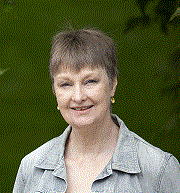

Rachel van Gorp multi career educator, formerly personal trainer, business owner and now a Senior Lecturer at School of Business, and chair of the OP Neurodiversity Community of Practice. Rachels passion for inclusion, and provoking korero on neurodiversity in tertiary education keeps her active and banishing normality from her classroom.





